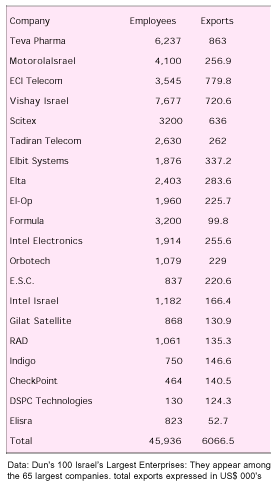Felix Zandman chairman of US Vishay Intertechnology, a Fortune 500 company, believes that the most
important issue of the 21st century is employment. Zandman, the head of the global enterprise, is short on
pontification and long on action. He founded Vishay Israel, a company active in electronics. The company
has grown steadily and is now Israel's 11th largest industrial company, based on the latest Dun's 100
Israel's largest Enterprises. Moreover, Mr. Zandman's son is now at the helm of Vishay Israel which
reports employing 7,677. Vishay Intertechnology International this summer approved a program to invest
$500 million in Israel between 2001 and 2006. The investment will create at least 4,000 new jobs here,
said Marc Zandman, the president of Vishay-Israel. The investment in Israel is part of Vishay's global
strategy to increase sales to $5 billion by 2006. The company's investment in Israel will not be
implemented immediately, as Vishay International CEO Dr. Felix Zandman is awaiting clarification of the
changes in taxation of foreign investments pursuant to the recommendations of the Ben-Bassat
Commission on tax reforms.
By the end of 2000 Vishay will have invested a total of $500 million in Israel.
Even if the next 500 startups register themselves as foreign companies the odds of any or all of them
providing employment in the thousands, are at best infinitessimal. Again on the basis of Dun's 100 Israel's
Largest Enterprises statistics of the 65 largest industrial companies by sales revenues: 20 fall within the
science based industries/high-tech category. These 20 concerns employed 45,936 personnel and were
responsible for $6.1 billion in exports.
Kobi Alexander, Comverse Technology chairman and president, recently threatened that Comverse would
not stay in Israel if it does not receive support from the State. "Israel should support a company such as
Comverse, or Comverse won't be here. The State of Israel need not help us.. But if it wants us to stay
here, it had better offer us adequate support - be it in the taxation process or through the Chief Scientist. If
the State of Israel wants to attract genuine industries that generate employment, it should tempt them to
stay on," Alexander, was quoted. He also criticized the view that the State should support start-up
companies rather than large companies: "Why support small companies? The amount of money on the
Israeli capital market is unparalleled. If a company fails to raise funds, it probably doesn't deserve to", he
said.
Comverse Technology has a Nasdaq market capitalization in excess of $12 billion. Though it is registered
in Guernsey Island, and has a business center in Missouri, it employs 2,560 workers in Israel, and several
times as many are indirectly employed through subcontractors.
The Minister of Industry and Trade and his staff would do well to listen closely to Comverse
Technologies' Kobie Alexander. Like Felix Zandman, Alexander understands the importance of
employment. His call for a good and supportive relation between Government and industry should be
heeded.
Placed side by side with the 20 industrial concerns, the Lucent Technology purchase of Chromatis, an
American company for $4.5 is a gigantic deal which only benefits a handful of individuals. Chromatis
employs only 32 personnel in Israel and several outside of its borders. Its employees will get $3.0 million
each and the founders may yet become billionaires. The exciting part of it all is that the ingenuity of two
individuals resulted in the deal. This is enough to encourage a whole generation of Israelis to study, to
persevere, to become entrepreneurs, because they see it can be done in Israel.
Regardless where Cromatis is registered it is still is seen as an Israeli achievement which proves that the
label---- created in Israel has acquired added value.
"Israel is losing not only its principal relative edge, but its very future: the high-tech industry. Over 90%
of new start-up companies incorporate as foreign companies; and, in order to evade material tax tests, their
business centers and management teams also get propelled out of Israel. Even when the research is
performed in Israel, the development products are transferred, at the end of the "approved enterprise" term,
to related companies overseas, which market the product and reap their profits in countries with a more
competitive tax rate. Any connection between companies such as EFI or Amdocs and Israel is barely
discernible. Mercury, incorporated in Delaware and valued at $7 billion, has only one third of its
employees at work in Israel, and pays almost all its taxes abroad, says advocate Ron Tira. His is one of a
small but vociferous and growing chorus of voices chanting for speedy radical tax reforms. Calling for tax
reforms is legitimate. No one whether in Israel, in the US, United Kingdom or France will oppose the call
for less bureaucracy.
However, when professionals roundly criticize the status quo and threaten the demise, before birth, of the
thousand new high tech companies that are formed each year, it would behoove legislators, the business
community and entrepreneurs to take a closer view and examine the realities in the field. 